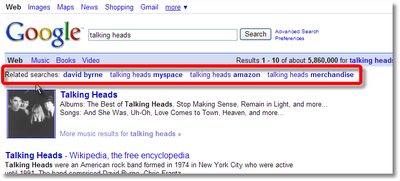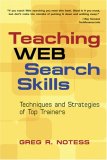Search News
Google Search Focus
Sometimes I find the Google blog posts to be long winded, high on hype, and low on information value. Yesterday's post about Google Search Quality started out in a similar vein, but it quickly improved and contains a number of interesting points about how Google handles searches and ranking. And for all those who like to say, "Just make it more like Google" and expect that to be a simple fix, please note the way Google describes their hard work on search quality is that "more than one thousand programmer/scientist years have gone directly into their development."
Several extracts that I found of interest include:
- Ranking algorithms include many aspects beyond PageRank:
- language models (the ability to handle phrases, synonyms, diacritics, spelling mistakes)
- query models (how people use language today)
- time models (some queries are best answered with a 30-minutes old page, and some are better answered with a page that stood the test of time)
- personalized models (not all people want the same thing)
- Evaluation includes automated evaluations every minute (to make sure nothing goes wrong)
- Change Frequency: "In 2007, we launched more than 450 new improvements"
While these do not, perhaps, have any direct bearing on how we can better use Google, it does help to inform us about the rationale for changing results and different processing from one day to the next.
Major Expansion at Google Translate
Earlier this month Google expanded the number of languages available in Google Translate. While the press release and most other coverage talked about ten new languages, the number of language pairs (from language X to language Y) increased far more substantially. Previously, Yahoo! Babel Fish had the most with 38 pairs. Google not only upped the number of possible languages, but every language listed can translate to the other. So depending on how you count, Google Translate now has over 500 language pairs available! That's a major increase. As Google Operating System notes, the counting varies depending on how you count Chinese. Only one choice is given for input of "Chinese," but Google Translate seems to accept both the Simplified or Traditional versions. Output can specify either Simplified or Traditional. So, if you count both versions of Chinese as one languages, this means Google Translate can machine translate 506 language pairs. If you consider that as two, it would be 552. And do note that you can input either version of Chinese characters and have it translated to the other.
Also note that Google has not only expanded its machine translation abilities but has augmented its Translated Search as well. Translated Search (also available on the Language Tools page as "Search Across Languages") will translate the query words and then display results in both the original language and in translation. Google translated search can machine translate query words and pages between the following languages. The following ten languages have been added along with the ability to translate between any of the possible language pairs.
- Bulgarian
- Croatian
- Czech
- Danish
- Finnish
- Hindi
- Norwegian
- Polish
- Romanian
- Swedish
Presumably, Google has been able to make such a major expansion of language translation pairs available by using statistical machine translation developed in house. This process is described in their FAQ: we feed the computer billions of words of text, both monolingual text in the target language, and aligned text consisting of examples of human translations between the languages. We then apply statistical learning techniques to build a translation model." Moving to this approach certainly seems to have allowed such a major expansion. Bear in mind that all of this automatic translation is prone to error, although it should give some rough sense of the underlying meaning. I've updated my Online Translation and Translated Search pages with the new languages.
Search Switching
For some time now I have been speaking and writing about ways of speed searching and search switching. Somehow, I've neglected to add the links to my site. So I'm fixing that tonight, before my presentation on Wed. at CIL 2008. The new Search Switching page includes sections for Search Switching Between Web Search Engines, Geographic Search Switching, Book Search Switching, and other options including another link to my Bookmarklets page (with its search transfer bookmarklets).
See also my article, "Speed Searching," in the March 2008 issue of Online (available for fee at ITI's InfoCentral or free from many library databases such as AccessMyLibrary) and my article, "Switching Your Search Engines," from the May 2007 issue of Online (available from many library databases including AccessMyLibrary).
Related Searches Moving Up?
So maybe I missed this earlier, but today is the first time I noticed Google showing related search suggestions at the top of Google results. In this case, I just happened to run on search for talking heads, trying to get an example of integrated content. While it worked for that, it also gave this one line of "Related searches:" at the very top. This is the first time that I can recall seeing this at the top.
Whether this is just one of Google's many user interface tests that may just run a short time or may continue and be seen at more searches, I don't know. Maybe it only shows up for music groups, although it did not for a few other searches I just tried. So far, the only other search I found that showed "Related searches:" was beatles. Anyone else seeing this?
Language Limit Showdown
In recent months I have been speaking and writing about some of the language search and translation features of the search engines. Which search engine has the most language limits? Which online translator has the most language pairs? And which ones offers translated search? (Exalead, Yahoo!, and Google, respectively). So I've added a new Language Search Tools page, with links to pages about Language Limits, Online Translation, and Translated Search. I have also finally made a major update to my Search Engines by Search Features page and linked the language page from there.
For many searchers, especially those of us in the middle of a fairly mono-lingual part of the U.S., the language tools may have little appeal, but even in the midst of Montana, I still find times that I come across a non-English site, email, or term that can benefit from the use of these tools.
Read More:
See the full blog to view older entries, the date archive, and the subject archive.


 Subscribe
Subscribe Now Available!
Now Available!